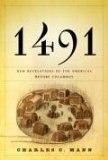Summary | Excerpt | Reading Guide | Reviews | Beyond the Book | Readalikes | Genres & Themes | Author Bio

Critics' Opinion:
Readers' Opinion:
First Published:
Aug 2005, 480 pages
Paperback:
Oct 2006, 528 pages
 Book Reviewed by:
Book Reviewed by:
BookBrowse Review Team
Buy This Book
That March Samoset—the third member of the triumvirate—appeared, having
hitched a ride from his home in Maine on an English ship that was plying
the coast. Not known is whether his arrival was due to chance or if
Massasoit had asked him to come down because he had picked up a few
English phrases by trading with the British. In any case, Massasoit
first had sent Samoset, rather than Tisquantum, to the foreigners.
Samoset had walked unaccompanied and unarmed into the circle of rude
huts in which the British were living on March 17, 1621. The colonists
saw a robust, erect-postured man wearing only a loincloth; his straight
black hair was shaved in front but flowed down his shoulders behind. To
their further amazement, this almost naked man greeted them in broken
but understandable English. He left the next morning with a few
presents. A day later he came back, accompanied by five "tall proper
men"—the phrase is the colonist Edward Winslow's—with three-inch black
stripes painted down the middle of their faces. The two sides talked
inconclusively, each warily checking out the other, for a few hours.
Five days later, on the 22nd, Samoset showed up again at the foreigners'
ramshackle base, this time with Tisquantum. Meanwhile Massasoit and the
rest of the Indian company waited out of sight.
Samoset and Tisquantum spoke with the colonists for about an hour.
Perhaps they then gave a signal. Or perhaps Massasoit was simply
following a schedule. In any case, he and the rest of the Indian party
appeared without warning at the crest of a hill on the south bank of the
creek that ran through Patuxet. Alarmed by Massasoit's sudden entrance,
the settlers withdrew to the hill on the opposite bank, where they had
emplaced their few cannons behind a half-finished stockade. A standoff
ensued.
Finally Winslow exhibited the decisiveness that later led to his
selection as colony governor. Wearing a full suit of armor and carrying
a sword, he waded through the stream and offered himself as a hostage.
Tisquantum, who walked with him, served as interpreter. Massasoit's
brother took charge of Winslow and then Massasoit crossed the water
himself followed by Tisquantum and twenty of Massasoit's men, all
ostentatiously unarmed. The colonists took the sachem to an unfinished
house and gave him some cushions to recline on. Both sides shared some
of the foreigners' homemade moonshine, then settled down to talk,
Tisquantum translating.
To the colonists, Massasoit could be distinguished from his subjects
more by manner than by dress or ornament. He wore the same deerskin
shawls and leggings and like his fellows had covered his face with
bug-repelling oil and reddish-purple dye. Around his neck hung a pouch
of tobacco, a long knife, and a thick chain of the prized white shell
beads called wampum. In appearance, Winslow wrote afterward, he was "a
very lusty man, in his best years, an able body, grave of countenance,
and spare of speech." The Europeans, who had barely survived the
previous winter, were in much worse shape. Half of the original colony
now lay underground beneath wooden markers painted with death's heads;
most of the survivors were malnourished.
Their meeting was a critical moment in American history. The foreigners
called their colony Plymouth; they themselves were the famous Pilgrims.*
As schoolchildren learn, at that meeting the Pilgrims obtained the
services of Tisquantum, usually known as "Squanto." In the 1970s, when I
attended high school, a popular history text was America: Its People and
Values by Leonard C. Wood, Ralph H. Gabriel, and Edward L. Biller.
Nestled among colorful illustrations of colonial life was a succinct
explanation of Tisquantum's role:
Excerpted from 1491 by Charles C. Mann Copyright © 2005 by Charles C. Mann. Excerpted by permission of Knopf, a division of Random House, Inc. All rights reserved. No part of this excerpt may be reproduced or reprinted without permission in writing from the publisher.





The Funeral Cryer by Wenyan Lu
Debut novelist Wenyan Lu brings us this witty yet profound story about one woman's midlife reawakening in contemporary rural China.
Your guide toexceptional books
BookBrowse seeks out and recommends the best in contemporary fiction and nonfiction—books that not only engage and entertain but also deepen our understanding of ourselves and the world around us.